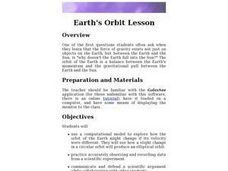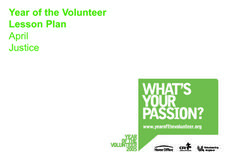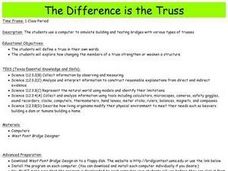Curated OER
Make Work Easier!
Pupils work in pairs to design a lever. They conduct experiments using a penny and nickel to explore the uses of a lever.
Curated OER
Dyslexia
Learners put a plus sign next to the picture if it is something they can do well. They help determine if each activity requires teaching, practice, and/or help from other people. They create scenarios that would require extra help for each.
Curated OER
Earth's Orbit Lesson
Tenth graders devise a computational model to explore how the orbit of the Earth might change if its velocity were different. Using accurately recorded data, 10th graders defend a scientific argument.
Curated OER
Justice
Learners consider the role of justice in the formation of the United States and in the operation of today's criminal justice system. They investigate symbols associated with justice and references to justice in the Constitution.
Curated OER
Data Gathering: Vietnam
Students study the Vietnam Era by interviewing people and writing a questionnaire to gather data on the attitudes, feeling, and experiences of the interviewee during this era.
Curated OER
Advise And Consent Lesson 1: Limits of Power
Middle schoolers examine the importance of citizens being involved in their community government for the common good. They look at the importance of limiting government and the concepts of philanthropy.
Curated OER
The Difference is the Truss
Young scholars use a computer to simulate building and testing bridges with various types of trusses.
Curated OER
Using the Hunter Model and the Holistic Model
Young scholars increase their knowledge of scientific processes in chemistry. They compare and analyze 3 sets of data, they have gathered, for accuracy and precision.
Curated OER
Density of a Gas
Eighth graders investigate the mass, volume, and density of a gas by producing it in a chemical reaction. The entire Density of a Gas Lab and L section of the K W L chart be formatively assessed.
Curated OER
Spectral Surprise
Students experience a model that produces, separating, and displaying spectral colors.
Curated OER
Colored Shadows
Sixth graders explore how three colored lights can be combined to produce a wide range of colors.
Curated OER
Geo-Vistas
Students create a geometric cardboard sculpture covered with personal drawings.
Curated OER
A Personal Reflection on the Canadian Parliamentary System and Its Delivery to Secondary Students
Students develop a newspaper portfolio of "Canadian Democracy At Work" and find examples of events/decisions/people from media sources to reinforce the concepts of Power and Authority in the Canadian context.
Curated OER
Government Lesson Plan: Lesson Plan 6
Students examine legislation on immigration policies. They discuss current immigration laws, read a handout, complete a chart, and answer discussion questions.
Curated OER
Lumping vs. Splitting
Learners transform ordinary long-scrolling page into a logically connected web of information.
Curated OER
Couch Potato or Inertia Victim?
Sixth graders how primary research is carried out. They design a simple survey questionnaire to interview people about their week average television watching time. They analyze the results and write a report based on the information.
Curated OER
Spontaneous Britishstrokes
Students are introduced to Chinese painting and they examine how Daoist phiolosophy influenced artistic style. They discuss how art and artistic technique as a reflection of Daoist culture. Students discuss how art is a reflection of...
Curated OER
TE Activity: Cool Views
Students define preservation and conservation before listening to an article read by the teacher about John Muir and Gifford Pinchot, famous environmentalists. They complete a Venn diagram before deciding which side of this environmental...
Curated OER
Oregon Forest Management Policy Decision Making
Fifth graders explore forest lands in Oregon and how the population affects forest management. They discuss benefits of retaining forests and logging. Given a mini-biography, 5th graders role play the forest management policies and...
Curated OER
Round Up
Students are chosen to be either cowboys or cowgirls. They use the hoppity hops for horses for the cowboys or cowgirls to ride. Students that are left are cows. They wait for the teacher's signal, the cows try to move away from the...
Curated OER
One Armed High Kick or Alaskan High Kick
Young scholars begin with a regular gymnastic warm up involving stretches and exercise before attempting the One Armed High Kick. Students are assessed by their peers and are declared successful if they can match each kick or exceed the...
Curated OER
Canadian History: The Seven Oaks Incident
Students examine primary source documents about the Seven Oaks Incident and consider the different perspectives written about it. They present their findings to the class orally or by creating posters.
Curated OER
Exploring County Ordinances
Young scholars discuss the purpose of county ordinances and view actual examples. In groups, they take the ordinances and describe how they are to protect the citizens of the county. They also discuss how interest groups affect policy...
Curated OER
Using Authentic Texts to Teach Vocabulary
Students read an article identifying any new vocabulary words they are unfamiliar with. Using the text, they discover antonyms, synonyms and word families. They answer comprehension questions and review the vocabulary to end the lesson.

























